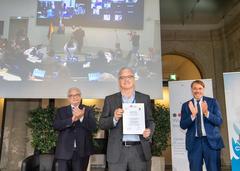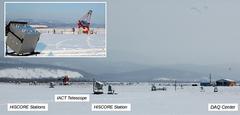URL: https://www.desy.de/news/news_search/index_eng.html
Breadcrumb Navigation
DESY News: Acclaimed German-Russian scientific collaboration
News
News from the DESY research centre
Acclaimed German-Russian scientific collaboration
As part of the German-Russian Year of University and Scientific Cooperation, the TAIGA observatory in Siberia’s Tunka valley has been commended as an outstanding example of bilateral cooperation. DESY project manager Ralf Wischneswki accepted the award on behalf of the entire project at the closing ceremony held under the patronage of the Minister of Foreign Affairs of the Russian Federation and the Minister for Foreign Affairs of the Federal Republic of Germany. Along with TAIGA, a further 24 outstanding bilateral collaborations are also being honoured. The German-Russian Year of University and Science Collaboration 2018 - 2020 was launched in December 2018 with a joint declaration by Heiko Maas and his Russian counterpart Sergey Lavrov.

A certificate was presented to DESY’s Ralf Wischnewski (centre) by Sergey J. Nechayev (left), the Russian ambassador to Germany, and Andreas Goergen (right), the head of the Directorate-General for Culture and Communication of the German Foreign Office.
Following German reunification, the Institute for High Energy Physics in Zeuthen near Berlin joined DESY, becoming its second site. Scientists here played a major role in building the world’s first underwater neutrino telescope NT-200 in Lake Baikal and later in the study of cosmic and gamma radiation in the Tunka valley, 50 kilometres from Lake Baikal. “The Baikal telescope was the first astroparticle physics project in Zeuthen and at DESY,” says Dosch. “Its success has been instrumental in making DESY a key German site for astroparticle physics.”

View of the TAIGA observatory in Siberia’s Tunka valley.
An important part of the cooperation between Germany and Russia concerns specific activities aimed at promoting fresh talent, such as exchange programmes for students, postgraduates and young scientists, organising scientific schools – like the annual International Baikal Summer School on Particle Physics and Astrophysics – and international conferences. The pilot complex of the TAIGA observatory will be completed in 2020, with a hybrid detector system covering an area of one square kilometre and comprising three gamma-ray telescopes (IACTs) and 100 detector stations. The TAIGA prototype will be used to investigate how the detection sensitivity of the observatory can be increased by about one order of magnitude using improved sensor technologies and a larger installation area.
The partners involved in the TAIGA collaboration are the Max Planck Institute for Physics in Munich, Irkutsk State University, the Lomonosov State University of Moscow, the National Research Nuclear University MEPhI in Moscow, the Joint Institute for Nuclear Research JINR in Dubna, the Institute for Nuclear Research INR in Moscow, the Pushkov Institute of Terrestrial Magnetism, Ionosphere and Radiowave Propagation of the Russian Academy of Sciences IZMIRAN in Troitsk, Altai State University in Bernaul, the Budker Institute of Nuclear Physics INP in Novosibirsk, Novosibirsk State University, the University of Hamburg and DESY.
Further reading:
- TAIGA in the theme year: https://wissenschaftspartner.de/lp/winner-906
- Website of the TAIGA project: https://taiga-experiment.info/



